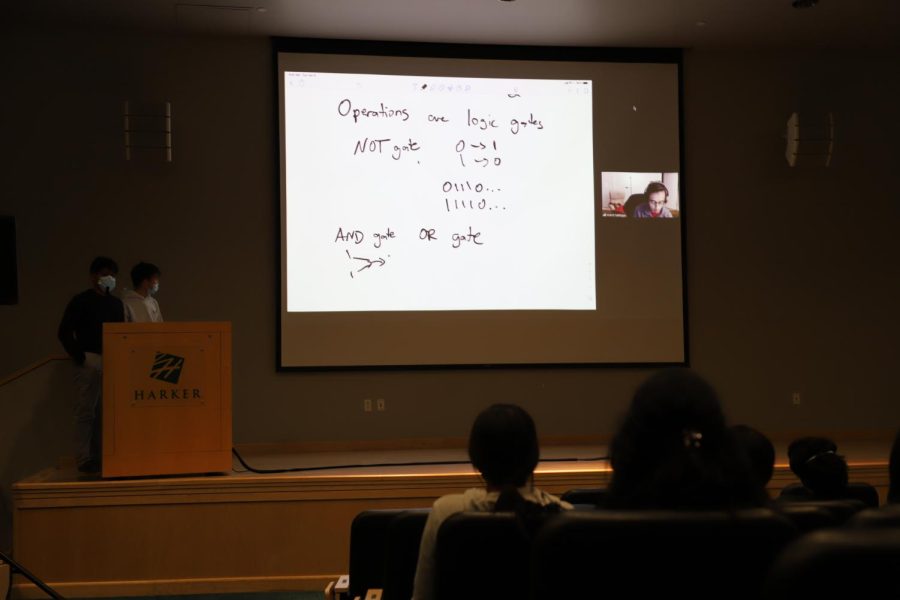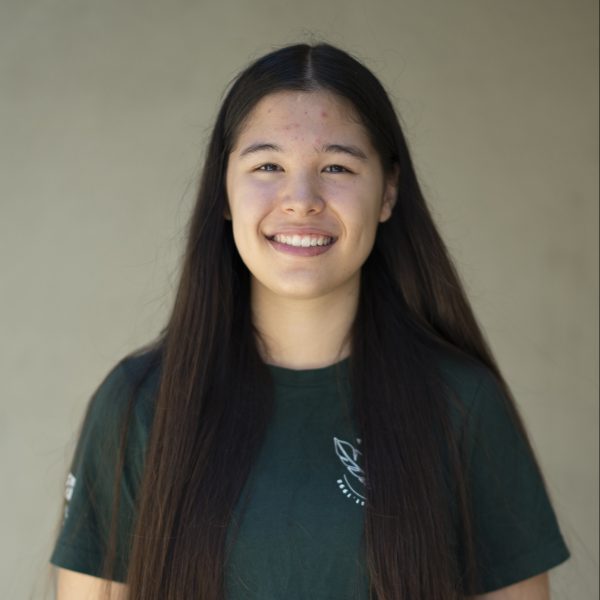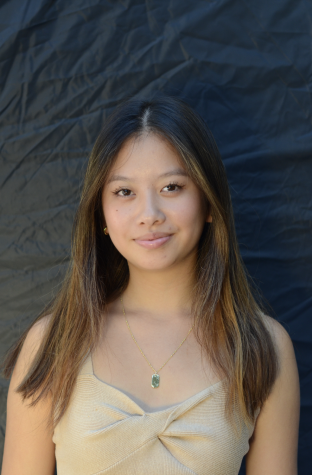Harker alumnus delivers introduction to quantum computing
Rishab Parthasarathy (12) and Alex Hu (12) help guide questions and relay them to Anand Natarajan (’09). The upper school Programming Club and Math Club invited Natarajan to speak about quantum computing in the Nichols auditorium on Wednesday.
December 4, 2021
The Math Club and Programming Club hosted Harker alumnus and Massachusetts Institute of Technology (MIT) professor Anand Natarajan (‘09) for a speaker event on quantum computing after school on Wednesday in the Nichols Auditorium.
Presenting over Zoom, Natarajan began the event by covering the terms that he would use throughout the rest of the presentation and discussed classical and quantum computers. Quantum computing applies concepts from quantum physics to computer science.
Quantum computers are unique because their qubits, which are units of information for quantum computers, can exist in two states at one time. For example, one qubit can be either 1, 0 or a superposition of both instead of just 1 or 0, which is the norm for classical computers. Based on the number of qubits, quantum computers have the ability to handle increasingly more calculations at an exponential rate.
Natarajan then explained probability and states in relation to quantum computers, creating an interactive experience by asking the audience questions and providing examples. To cement abstract topics, Natarajan also used diagrams like a Bloch sphere, a visual representation of a qubit. To conclude the content-heavy section of his lecture, he examined Grover’s Algorithm and different algorithms used in quantum computing.
“The whole name of the game in quantum computing is to try to find paths that you can somehow solve faster by a pure number of operations, if you’re allowed to do these rotations and so on, that you can just do them with a randomized computer,” Natarajan said.
After an interactive Q&A session, Natarajan ended with a description of his career, starting with his experiences at Harker. After high school, he attended Stanford and graduated with a bachelor’s degree in physics, returning for a master’s degree in computer science. Natarajan later earned his PhD in Physics at MIT, where he then became an assistant professor. Programming Club president Rishab Parthasarathy (12) appreciated learning about Natarajan’s journey.
“It’s really great to see someone who was once in the same position as us, to see someone who has reached success,” Rishab said. “First of all, it provides a role model but also provides an example people can emulate by seeing someone who has done [the same thing] you can learn from what his experiences and what his perspectives are.”
Alex Hu (12), president of Math Club, values quantum computing because it allows students to see real-life applications of math class and offers more exciting possibilities for mathematically-inclined students.
“It’s great to see how quantum computing is grounded in a lot of math, and so when people study math, they understand how math is really powerful and how it has applications to change our world,” Alex said.
As someone who was new to the concept of quantum computing, Olivia Xu (10), a member of the Programming Club and a lecturer and curriculum designer for the Math Club, expressed her interest to learn more about quantum computing in the future.
“I was able to get the basic gist of quantum computing, and I think after the talk, I definitely want to look more into it because I think it’s really cool how it combines math and physics and computer science,” Olivia said.
To end the speaker event, Natarajan encouraged the attendees to explore their options broadly before college and push the boundaries of their fields.
“Luck favors prepared people,” Natarajan said. “So, you want to maximize the chances that luck works at your advantage, so you should try to be aware of all the open problems in your field, all the possible connections, and eventually something amazing might turn up.”
A previous version of this article misspelled Anand Natarajan’s last name as Ratarajan in the feature photo. The article has been updated on Dec. 6, 2021, to reflect the correction of this error.


















![“[Building nerf blasters] became this outlet of creativity for me that hasn't been matched by anything else. The process [of] making a build complete to your desire is such a painstakingly difficult process, but I've had to learn from [the skills needed from] soldering to proper painting. There's so many different options for everything, if you think about it, it exists. The best part is [that] if it doesn't exist, you can build it yourself," Ishaan Parate said.](https://harkeraquila.com/wp-content/uploads/2022/08/DSC_8149-900x604.jpg)




![“When I came into high school, I was ready to be a follower. But DECA was a game changer for me. It helped me overcome my fear of public speaking, and it's played such a major role in who I've become today. To be able to successfully lead a chapter of 150 students, an officer team and be one of the upperclassmen I once really admired is something I'm [really] proud of,” Anvitha Tummala ('21) said.](https://harkeraquila.com/wp-content/uploads/2021/07/Screen-Shot-2021-07-25-at-9.50.05-AM-900x594.png)







![“I think getting up in the morning and having a sense of purpose [is exciting]. I think without a certain amount of drive, life is kind of obsolete and mundane, and I think having that every single day is what makes each day unique and kind of makes life exciting,” Neymika Jain (12) said.](https://harkeraquila.com/wp-content/uploads/2017/06/Screen-Shot-2017-06-03-at-4.54.16-PM.png)








![“My slogan is ‘slow feet, don’t eat, and I’m hungry.’ You need to run fast to get where you are–you aren't going to get those championships if you aren't fast,” Angel Cervantes (12) said. “I want to do well in school on my tests and in track and win championships for my team. I live by that, [and] I can do that anywhere: in the classroom or on the field.”](https://harkeraquila.com/wp-content/uploads/2018/06/DSC5146-900x601.jpg)
![“[Volleyball has] taught me how to fall correctly, and another thing it taught is that you don’t have to be the best at something to be good at it. If you just hit the ball in a smart way, then it still scores points and you’re good at it. You could be a background player and still make a much bigger impact on the team than you would think,” Anya Gert (’20) said.](https://harkeraquila.com/wp-content/uploads/2020/06/AnnaGert_JinTuan_HoHPhotoEdited-600x900.jpeg)

![“I'm not nearly there yet, but [my confidence has] definitely been getting better since I was pretty shy and timid coming into Harker my freshman year. I know that there's a lot of people that are really confident in what they do, and I really admire them. Everyone's so driven and that has really pushed me to kind of try to find my own place in high school and be more confident,” Alyssa Huang (’20) said.](https://harkeraquila.com/wp-content/uploads/2020/06/AlyssaHuang_EmilyChen_HoHPhoto-900x749.jpeg)












